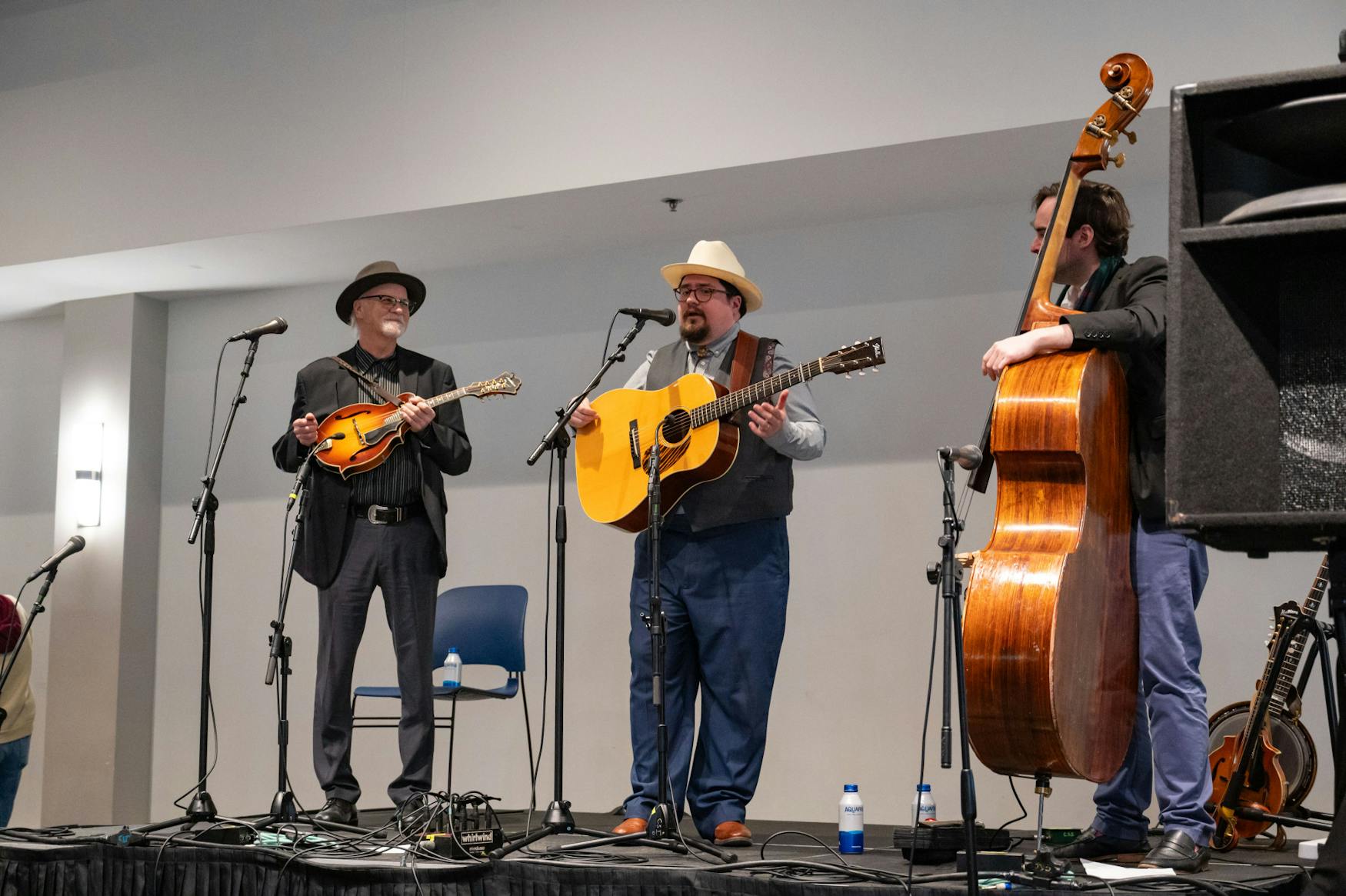Music professor Taylor Ackley’s contract to end in 2025
Prof. Ackley, a specialist in American folk and ethnomusicology, will be the next to leave the University amidst budget cuts to the music department.
Prof. Taylor Ackley (MUS) has been teaching at Brandeis since 2022. A doctor of ethnomusicology and specialist in American Roots music, Ackley runs the Roots Music Ensemble and teaches several classes for the music department. According to his website, his research aims to “understand and analyze the American Folk and Roots music as art grounded in the experiences of poor and working class people.”
In an Oct. 28 email to members of the music department from Lance Rothchild ’26, a member of Roots Ensemble, it was revealed that his contract would not be renewed for the 2025-2026 school year, a decision which they described as “short-sighted and wrong.”
In an interview with The Justice on Oct. 23, director Ted Gilman emphasized Ackley’s importance to the Brandeis Osher Lifelong Learning Institute, which provides learning opportunities for intellectually curious adults. As Gilman put it, “[Ackley’s] courses are wildly popular, they routinely fill up to the registration capacity … His reviews are extraordinarily good.” At this point, around one quarter of BOLLI’s participants have taken a course with Ackley. Gilman described how Ackley brings a youthful and spirited energy to BOLLI’s courses, a welcome presence in a community that consists mostly of retired individuals.
Recently, Gilman said Ackley has been teaching courses at the University of Massachusetts Boston and the University of Massachusetts Amherst’s Mount Ida Campus. According to Gilman, they have been well-attended and well-liked courses. “Taylor does a magnificent job of creating community,” Gilman explained. “[Ackley’s] classes are mostly discussion-oriented, and everyone who attends is ‘riveted.’”
Before the official decision on Oct. 28, Ackley had told Gilman personally that his contract might not be renewed. Gilman described to The Justice the impact Ackley’s departure would have on BOLLI: “[Ackley] is irreplaceable because of the interesting combination of performer, ethnomusicologist and extraordinary teacher” he described. “We hope it’s not too late to reverse that decision … He is well-loved.”
Pia Daliana ’27, a member of Roots Ensemble, described the experience of learning under Ackley in an Oct. 25 interview with The Justice. Historically, Roots Ensemble has been offered as a course in the Spring semester.
“[One thing] I really liked about Professor Ackley is that he was so encouraging, wanting people to put themselves out there, but not too pushy,” Daliana stated. She recalled that Ackley had encouraged a quieter member of the ensemble to lead a song, and it had ended up being a memorable experience. “If Professor Ackley hadn’t provided the emotional support … we might not have had such a special moment with that specific song.”
She went on to express appreciation towards Ackley for his enthusiasm and ability to convey his knowledge of folk music. “He just wanted us to explore,” she described. “He would go into small mini-lessons to give us context about the pieces that we were singing … He’s got a very comprehensive view of what traditional American music is, in addition to the great impact that it has on modern popular music.” Faithful to his mission statement, Ackley was careful to emphasize the beauty and complexity of roots music despite it being commonly downplayed in the music industry due to elitism.
The music in Roots Ensemble was learned by rote, meaning that the music was learned by ear rather than the more traditional style using sheet music. This type of learning is typically done in a group setting. “When you learn by rote, you’re forced to collaborate with the people next to you,” she said. Though Daliana has learned by rote before, she explained that she has never had an experience doing so quite like the one in Roots Ensemble. Because Ackley grew up doing Roots Music, he was able to bring an even more authentic experience to the classroom.
Ackley made sure that community was central to the experience of being in Roots Ensemble. “I still say hi to everyone I saw [in Roots Ensemble],” Daliana mentioned. The members of her ensemble all agreed: “If we have time, we’re going to try to do it again [next] spring.” Though Daliana acknowledged that the ensemble would be unique each year and that a different professor would likely teach it well, Ackley had brought himself to the ensemble that was especially effective.
Though Gilman and the BOLLI community were not able to directly influence whether Ackley’s contract was renewed, they had started a letter-writing campaign to Jeffery Shoulson, Dean of Arts and Sciences before the official decision was made.
The email from Rothchild announcing Ackley’s departure also encouraged those who would be affected to email Shoulson and advocate for Ackley.
Besides the pressures of budget cuts, Gilman suspects that Ackley’s potential departure is due to him being on a shorter-term contract. “Junior faculty should not bear the brunt of financial problems in the institution,” Gilman asserted. “Letting faculty go or not renewing their contracts impacts the students and impacts their ability to take courses and have advisors and all kinds of activities that are essential to their success.”
Ackley’s departure exists in the context of major budget cuts, which have fallen disproportionately on Brandeis’s fine arts departments. These changes have included the cutting of the musicology and composition Ph.D. programs, and most recently a 25% faculty reduction to the music department and the elimination of the Lydian String Quartet. Both of these changes have sparked worry about Brandeis’ reputation among faculty and students, a concern which will likely grow with Ackley’s departure.




Please note All comments are eligible for publication in The Justice.